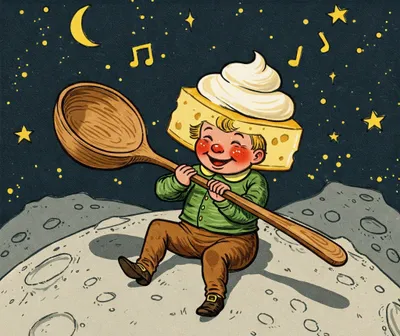Aiken Drum

Lyrics
There was a man lived in the moon,
And his name was Aiken Drum.
Chorus
And he played upon a ladle, a ladle, a ladle,
And he played upon a ladle,
and his name was Aiken Drum.
And his hat was made of good cream cheese, of good cream cheese, of good cream cheese,
And his hat was made of good cream cheese,
And his name was Aiken Drum.
And his coat was made of good roast beef, of good roast beef, of good roast beef,
And his coat was made of good roast beef,
And his name was Aiken Drum.
And his buttons made of penny loaves, of penny loaves, of penny loaves,
And his buttons made of penny loaves,
And his name was Aiken Drum.
And his waistcoat was made of crust pies, of crust pies, of crust pies,
And his waistcoat was made of crust pies,
And his name was Aiken Drum.
And his breeches made of haggis bags, of haggis bags, of haggis bags,
And his breeches made of haggis bags,
And his name was Aiken Drum.
History and Meaning
Aiken Drum is one of the most colourful characters in the world of nursery rhymes, a whimsical figure conjured up in Scottish tradition and best known for his truly bizarre outfit. The song paints a vivid picture of a man clothed entirely in food: perhaps a hat made of cream cheese (or "guid cream cheese" in Scots), a coat of roast beef, buttons of shiny pennies or maybe crab apples, and even breeches sewn from haggis bags!
If you dig a little deeper than the playful surface, you'll find whispers of history clinging to Aiken Drum. The rhyme first appeared in print in James Hogg's Jacobite Relics in 1820, a collection focused on songs related to the supporters of the Stuart kings. This has led many to believe Aiken Drum isn't just a random figure, but perhaps a symbol of Scotland itself, resilient but maybe poorly equipped, possibly linked to events like the Jacobite rising and the Battle of Sheriffmuir in 1715. In this light, his food-based clothing could represent Scottish produce or even the hardships faced during turbulent times.
For countless children and adult though, he's just a figure of delightful nonsense, said to live on the moon in later versions of the rhyme.